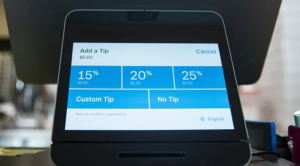Tipping has become a hot topic in recent years, with many Americans feeling that it has gotten “out of control.”
A recent survey from WalletHub revealed that 75% of consumers share this view, and they are not alone. Experts such as Dr. Melissa Dallas, professor emeritus at Missouri State University, agree that the tipping culture has become excessive, causing financial strain for both consumers and employees.
One of the main factors contributing to this issue is the pressure placed on consumers to leave a tip. The survey found that over 60% of people see tipping as something they should give when they feel like it, rather than an obligation for every service.
Additionally, half of the respondents stated that they often leave a tip due to “social pressure,” rather than exceptional service. This mentality has led to higher expected tip percentages for a wide range of services, putting a strain on consumers’ disposable income.
At the same time, the economic downturn has caused financial difficulties for many tipped employees. As a result, a 15% tip, which was considered standard in the past, is no longer sufficient to cover the expenses of everyday life. This has fueled the expectation of higher tips from employers, further burdening consumers.

Another concern highlighted by the survey is the belief that businesses are replacing employee salaries with customer tips. While the Department of Labor does have regulations in place to ensure that tipped employees are paid fairly, there are disparities across different states.
Some states do not allow the tip credit, meaning that employers are required to pay minimum wage in addition to tips, while others only meet the federal standard. Employee advocates argue that this system does not always lead to higher wages and can create a thorny legal landscape.
The rise of service charges has also added to the confusion surrounding tipping. In some areas, these fees have replaced traditional tip percentages, and they can include employees who do not traditionally receive tips. This practice, known as tip pooling, has sparked debate over whether it ultimately benefits employees.








